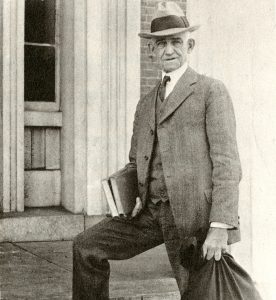
Sidney Nelson Morse taught English, and occasionally Latin and Greek, at Williston Seminary from 1890 until 1927. A product of Williston, class of 1886, and Yale, 1890, he also served as Alumni Secretary, remaining in that role for several years beyond his “official” retirement. From 1918 to 1927 he was Secretary to the Faculty. His principal responsibility was to take the minutes of weekly faculty meetings. These documents survive, in 48 exam bluebooks, scrawled in Morse’s sometimes challenging handwriting and often written in the distinctive blue pencil which, for reasons unknown, he favored.
While admittedly there is much repetition in the texts, gems emerge. The minutes are, in fact, a detailed chronicle of Williston life from the perhaps necessarily narrow window of her teachers. Here we present some excerpts from approximately a century ago, 1918-1921, which might resonate today. (Editor’s annotations are in italics.)
November 22, 1918: “Suggested that a teacher be detailed to be in Northampton Sat. night and to come back in the last car to see that Williston boys are O.K., each teacher in turn.” (In those days light rail service ran between Easthampton and Northampton.)
(The First World War had finally ended in November, 1918. With the Armistice came a demand for more “normal” campus activities.)
March 14, 1919: “The matter of petition from the students to take 2 hrs. military drill a week in place of 4 was not acted upon except so far as to leave unchanged the present schedule in general until May 1, & any slight changes to be left at the discretion of Sergt. Graham.” (Sergeant Alfred Linton Graham had served with the Canadian Army from 1914 until his discharge in January 1918. Williston employed him as a military instructor during the 1918-19 school year.)
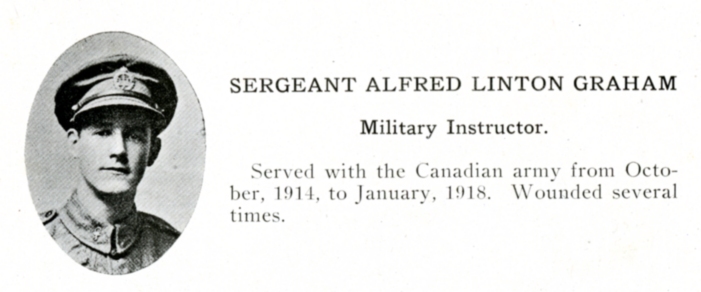
This writer’s sense is that there is far too much of the following. It should be noted, though, that such discussions of individual disciplinary matters among the full faculty continued until fairly recently. Even after a century, it seems appropriate to abbreviate students’ names.
May 16, 1919: “Moved, that R___ M___ be kept on strict probation and denied all out-of-bounds privileges for the rest of the term; and if he be allowed to return next year, his return to, and continuance in, Williston shall be strictly conditioned (Unexcused absences beyond 20 for the year 1918-19). Carried.”
“Moved, that J___ A___, for presenting forged excuses for absence from school exercises be put on strict probation as to conduct and attitude toward his work; and further, in case he returns to school next year, he shall pay in advance full tuition for each term. Carried.”
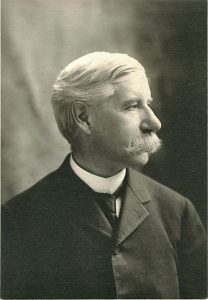
In June, 1919. after 63 years of service to Williston, Headmaster Joseph Sawyer retired. His successor, Archibald Victor Galbraith, arrived with some radical ideas about the treatment of new students.
September 19, 1919: “Remarks by Principal about interfering with new boys to their embarrassment. ” Morse does not, however, detail Dr. Galbraith’s remarks.
Special Meeting, November 3, 1919. “The case of H___ D___’s smoking in public in Ashburnham, Sat. Nov. 1 game [vs. Cushing Academy], thus breaking explicit rule, was taken up. In view of his previous record, and in view of the fact that he was on virtual probation, the Faculty were unanimous in recording D___’s permanent separation from Williston.”
November 14, 1919: “The vote recently passed by the Trustees regarding the change of name of the School from Williston Seminary to The Williston School, and a letter by Prin. Galbraith explaining the proposed change — this letter and Trustee vote to be submitted to the Alumni — was read & commented on by the Faculty.” (The proposed name change did not take place. The issue would be revisited in 1925, at which time the the school was renamed Williston Academy.)
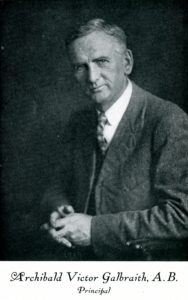
“F___, for his indifference and oddities, was mentioned as a fit subject for a word of counsel by the Principal.”
December 12, 1919: “The query of the teachers concerning the accommodation of boys living at a distance, by setting examinations earlier than the schedule provides for, was answered by saying, in general, that any deviation from the schedule already arranged would cause confusion & be unwise.” (This remains an issue of discussion in 2020.)
“No boys shall attend the dance Dec. 13 in the Gymnasium unless they are present with girls under the approval of those supervising the dance.”
January 30, 1920: “The question was raised and remarked on as to S___’s attitude toward his school work and buffoon-like demeanor, especially in chapel.”
February 6, 1920: “Gen’l satisfaction on the part of the teachers in view of the fact that improvements in the shape of bathrooms are to be installed in North and South Halls.” (Both buildings had been built before the Civil War. Change came slowly at Williston.)
February 13, 1920: “D___’s request to play drums at a dance was granted with some reluctance. The opinion was that excuses for doing remunerative outside work should rarely be granted — that a boy’s first business was on his books.”
February 20, 1920: “By vote of the faculty at a previous brief meeting, class exercise was held at 3 o’clock Fri. Feb. 20; and the 2 Sat. morning recitations & chapel omitted — closed at 10 o’clock to enable boys to get away earlier — the flu quarantine having been lifted.”
Given the devastation wrought by the Spanish influenza pandemic of 1918-1920, it is surprising to note that no mention has been found of a quarantine having been imposed. Were such quarantines routine? The minutes for December 1, 1924, read, “The Principal spoke of Payson Hall quarantine for 7 days as a precaution vs. any possible danger from Scarlet Fever. One boy from there, B___, has been placed in the contagious ward, Holyoke Hospital. No further cases yet reported.” Present-day responses to the COVID-19 virus serve to remind us that the concerns of a century since are, perhaps, not so distant.
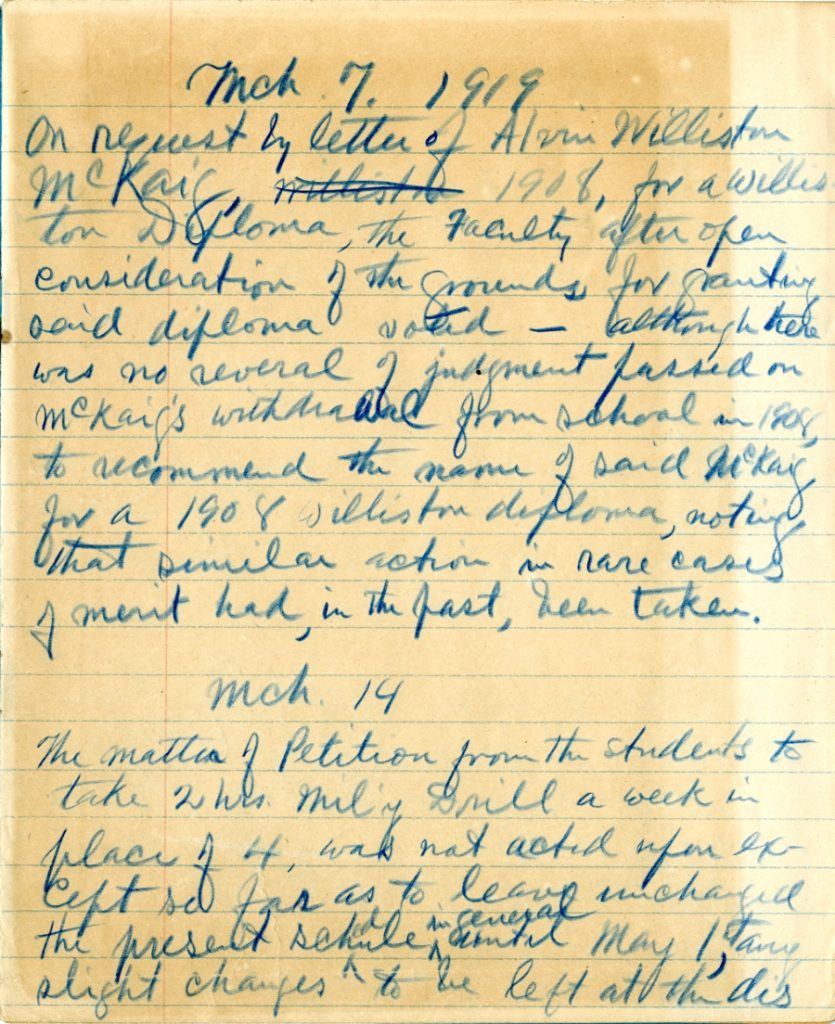
March 5, 1920: “A matter of interest [at a meeting of the Association of Headmasters] was a discussion of the new test of admission to college, namely, psychological in connection with the record of school work. The general conclusion was that the connection between these tests and college work was very close.”
March 15, 1920, Special Meeting: Facts regarding M___’s general attitude toward school and specifically his ungentlemanly conduct toward a nurse at Ford Hall (under momentary hysteria or spell of emotionalism considered by him as a joke) convinced the Faculty that his presence here was undesirable. No one voted in favor of his return.”
April 23, 1920: “A matter of vital interest to the faculty and to the school in general was presented by the Principal relating to the request coming from the Student Council, in regard to the scholarship grades for eligibility of athletes on the various teams. The details are not formulated, but the Faculty were solidly unanimous that a minimum scholarship be set below which, if a student falls, he is not eligible to membership on the athletic teams.”
“Mr. Kaemmerlen asked that to S___ a word of praise be passed in recognition of his ‘first aid’ work at the time of the bridge accident in the case of A___.”
April 30, 1920: “Specifically as to membership in Fraternities, the Student Council members favor scholarship grade requirements.” It is interesting that the impetus for requiring a standard of academic achievement for team and fraternity membership came from the students themselves. The Student Council was made up of the Presidents of the several fraternities.
“‘Put-through’ week to be free from undignified public displays.”
“Comments pro & con on the question of soliciting program advertisements for ‘Officer 666’ dramatics simmered down to ‘better not.'”
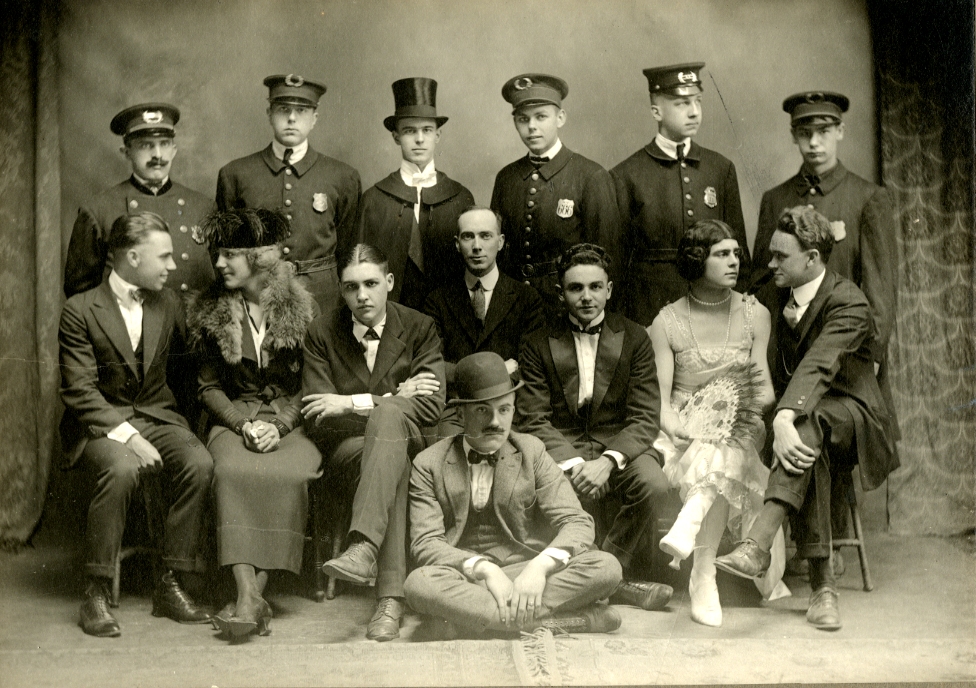
September 13, 1920: “Interference with new boys: ‘We want absolutely none of it.’ — Prin. Galbraith” By 1926 Galbraith had concluded that most campus bullying and petty crime actually originated with the six fraternities, which he successfully suppressed in 1926-28. For more concerning Williston’s late and un-lamented secret societies, see So Help Me, Alan Quatermain.
September 17, 1920: “The Principal requested that encouragement be given to earnest boys, in particular new boys who feel that their studies are hard —and ‘lend a hand’ may well be the slogan of the teachers.”
“Teachers on campus duty evenings are to call at the several rooms twice, and besides, at 10:30 to see that lights are out. . . . To ensure a fair distribution of campus supervision, and make it effective, it is of vital importance that each teacher living on the campus faithfully meet his evening requirement.” This admonition was repeated practically verbatim at the October 8 meeting.
October 8, 1920: “Mountain Day was set for Oct. 12 (Columbus Day). On Mon. evening, Oct. 11, more or less freedom to be exercised in the way of granting excuses, but study hours to be observed Tues. evng. at 8 o’clock.”
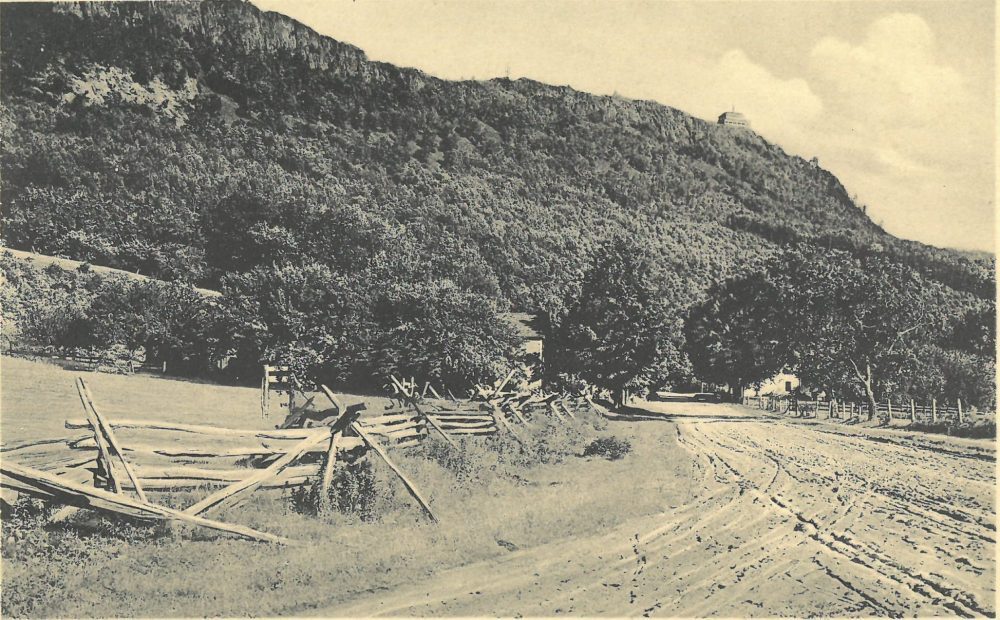
November 12, 1920: “Mr. Stevenson felt that his Division in American History was becoming congested with undesirable weaklings who needed the benefits of the preceptorial system instead of the general class instruction.”
December 3, 1920: “B___, C___, K___ were reported as offenders vs. observers of study hours by getting into the gymnasium some other way than the right way.”
December 10, 1920: “Teachers from the different entrances reported on the condition of rooms and entries. Favorable on the whole — tho’ there is room for improvement. The drive for sanitation and cleanliness is on! Push it! is the slogan.”
December 18, 1920: “A written petition from the Spanish students in school to be allowed to form a Spanish American Club, to be under the supervision and direction of a Faculty Adviser . . . was unanimously favored. By choice of the Club Mr. Friedman was named as Adviser.”
February 4, 1921: “I___ reported a delinquent and a laggard — late, bookless, unprepared.”
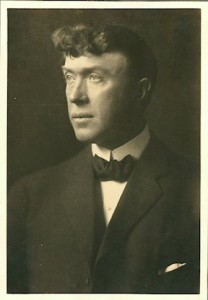
February 11, 1921: “Comment on the number of unexcused absences led to the remark by Mr. Tibbets that it would seem advisable, perhaps now or later, to centralize absences from school duties (other than Chapel requirements) in the hands of one teacher who shall follow up and report weekly in Faculty Meeting. Mr. Tibbets does not aspire to this office.” (For more concerning George Parsons Tibbets, see The Impossible Mr. Tibbets.)
“A proposition by the Principal, that application be made for the privilege of forming a Cum Laude Society, to affiliate with societies of like kind at other Preparatory schools —corresponding to ΦΒΚ in the Colleges — was met with unquestioned favor by the Faculty.”
February 24, 1921: “Caution to teachers!! Caution no. 1. Teachers were cautioned — and it seems necessary to reiterate the caution term-by-term — about ‘leaking Faculty comments and discussion’ — and teachers were agreed that it is far from discreet or just even, to disclose the name of any teacher who may, in Faculty meeting, contribute data, relate incidents, or express opinions on school matters. For when a teacher’s name is mentioned in connection with school discipline, then what he has said as contributary evidence desired by the Faculty is frequently marked by the student as a personal animadversion upon himself.
Caution no. 2. Don’t speak outside so loud in discussing school matters or discipline as to inform curious and itching student ears.”
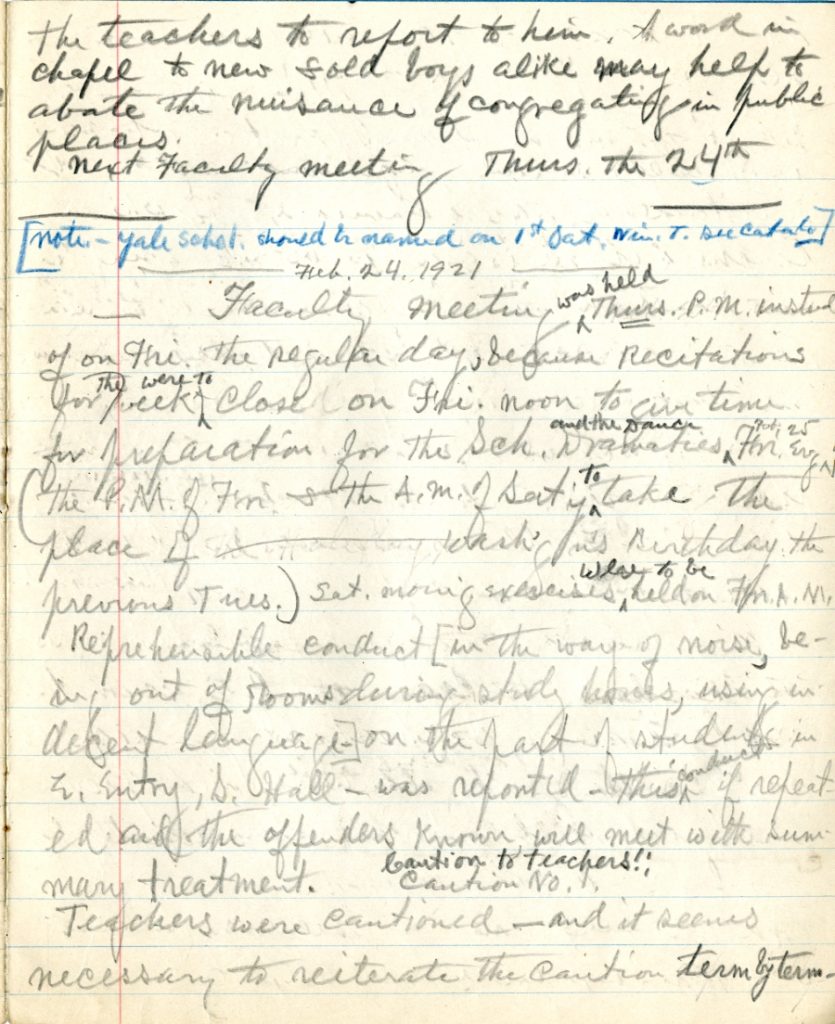
March 11, 1921: “Mr. Buffum commended the purchase for the School Library a set of 4 vols. (recently published), Short Story Summaries of 100 Choice Novels.” You knew it as “Masterplots” or “Cliff Notes.”
March 18, 1921. “An interesting letter from a representative of the College Board Examinations revealed the fact that a genuine purpose was afoot to stabilize and humanize examinations, to make them reasonable in scope, and bring them within reasonable time limits.”
April 22, 1921. “S__ and W___ were dismissed from school Mon. April 18 because of their indulgence in ‘home brew,’ and its effects.”


Riveting! The “No Smoking” or you’re BANISHED continued for a long time.
Love the “buffoon-like behavior in chapel”. Sparks the imagination, now recalling
A__________G____________ f___a____r______t______i_____n______g in nighttime study hall.
Interesting read. Good job Rick!
Glad to see that my father’s name did not show up in these minutes. He was Philip B. Wainwright of the class of 1923.
Very interesting! Great work, Rick!
Some things are eternal! Interesting read.